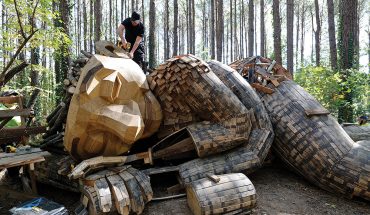
Mary Spears with Majestic, 31, at Helping Horse in Raleigh. Spears has been volunteering at the non-profit since 2001.
by Todd Cohen
photographs by Juli Leonard
For people with physical, mental, and emotional disabilities, the simple tasks that are second nature to most can be a struggle. At a special program in Raleigh, horses help people with disabilities to develop balance, coordination, and self-confidence.
“The students have to deal with so many limitations in their daily life,” says Mary Spears, president and rider coordinator for the Helping Horse Therapeutic Riding Program. “They work so hard just to learn what they need to do to sit on the horse and do the things we take for granted. They are very inspiring. Everything is such a challenge. They work hard and they get a lot of joy.”
Founded in 1989 by a small group of Wake County horse lovers, the all-volunteer nonprofit serves up to 40 students who range in age from 4 to senior citizen in a 30-week session that runs from September through May.

Mary Spears with Majestic, 31, at Helping Horse in Raleigh. Spears has been volunteering at the non-profit since 2001.
Each one-hour lesson requires a lot more than horsepower: In addition to a volunteer instructor, there’s also an assistant instructor, a volunteer to lead every student-ridden horse, and two more volunteers to walk along either side of every horse.
Once enrolled in the program, students typically return every year. Some begin as children and continue into adulthood.
Spears, 63, is a native of Cincinnati. She began volunteering for Helping Horse in 2001 as a horse leader and sidewalker.
She lives nears Falls Lake with her husband, Jeff Spears, medical affairs director for hematology at Grifols. They have five children, ages 26 to 37, and eight grandchildren.

Mary Spears with Majestic, 31, at Helping Horse in Raleigh. Spears has been volunteering at the non-profit since 2001.
How do you match students and horses?
We work with each student on … what skills they need. We have nine horses. They are donated. They have to be a certain personality and be able to tolerate being pulled on and given directions that are not necessarily what they’re used to. Many of our students are very mobile on the horse – a lot of movement and noise. Horses have to be able to be very calm under unusual circumstances. Most of our horses are older. They’ve been trail-ridden. When we get them, they have a trial period of 60 to 90 days to make sure we want to keep them with the program.
What kinds of results do you see?
It is difficult to quantify because every child is so different. We can see obvious things. We’ve had a student we were told was nonverbal (who was able) after a few years (to) spell words and speak. We’ve had students who have been with us from the beginning – who started out quite young and are young adults now.
How big is your campus?
We have 13 acres: a barn, a riding arena, and access to trails on adjoining property – private land we are allowed to use.
You have no paid staff?
We are 100 percent volunteers. We have at least 100 volunteers. We have a full-time volunteer horse caretaker who lives on the premises. Every night we need 15 to 20 volunteers and instructors on top of that. Our board is a working board. We have instructors on the board, maintenance people on the board. Everyone on the board gets their hands dirty in the program. We are always looking for volunteers. They’ll see amazing things. I’m also an assistant instructor. I do whatever needs to be done.
How do students find you?
They often do a web search. They’ll look for “therapeutic riding” and Helping Horse will come up. We’ve had pediatricians refer them, neurologists, groups like the Down Syndrome Society and Autism Society. And word of mouth.
How do you finance your operation?
Our annual budget is about $50,000. We have grants and fundraising, and we do charge tuition. Tuition is $35 a class, or $1,050 for a 30-class session. Tuition covers about half our budget. Everything goes toward maintaining the horses and facilities. We are hoping to start doing events. We have an annual Christmas wreath sale that nets $2,000 to $3,000.
How did you get involved with Helping Horse?
I was looking for a way to get involved with the community. I found a volunteer opportunity in the newspaper. It seemed like a perfect fit. It had horses and it had a special way to help the special needs community.
What did you want to be when you grew up?
I wanted to be a vet. I loved animals. I was always trying to bring home critters. I did start out in school working toward a biology degree with that intention, but I ended up switching to medical technology.
If you could fix a social problem, what would it be?
I would get more funding for mental health issues. There’s a lot of mentally ill people hurting very badly.
What motivates you each day to do something to give back?
I just have been so blessed. I want to be able to give to other people, and maybe be a blessing to them.
What is your philosophy of life?
Try to find joy every day and help others find joy in their life.
For more information, call Helping Horses at 919-435-4487 or visit helpinghorse.org



